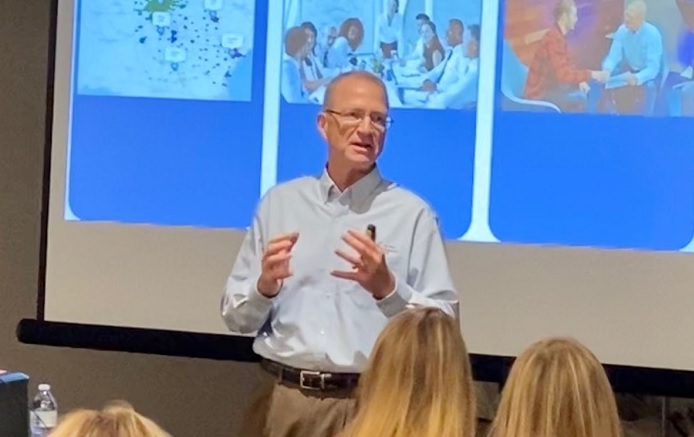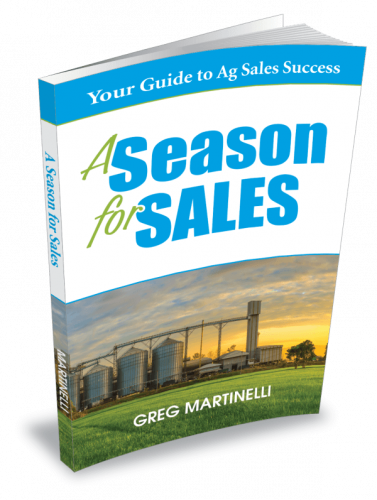Are you passing or failing your customer’s test?
Every day, an army of Ag salespeople drive up and down the county roads in search of sales. Driving down the farm driveway, pulling into the agribusiness parking lot, and calling-texting-zooming with customers through the latest technology.
All of us are out there making variations of these seven sales fails. And our customers give us their passing grade when they either buy from us or they give us a failing grade when they say, “Let me think about it” or tell us “I’m happy with what I’m doing”.
In workshops, these seven fails are a primary focus as few salespeople put them all together in their approach. They are looking for a way to stand out from their competition. See if you pass or fail in these seven areas.
Fail #1: They Can’t answer the first two primary customer questions:
- Why should I buy from you? When I pose this question to audiences, they typically start to tell me about their company. I have to stop them and let them know we will get to that. However, this question is all about themselves. Ag sales are normally a long-term selling situation. We must know how to answer the first question our customer is thinking when we ask for their business. “Why should I do business with you?”
- Why should I buy from your company? Now, we can start talking about all the great things our company can do for customers. Just remember, the answer to this question must be in the view of the customer. Sometimes, I hear salespeople tell me all about the features and benefits of their company that customers don’t really care about. Or don’t care enough to switch their business to you. For example, the number of countries you are operating in, the hundreds of employees at your company, or the 100 years you have been in business. All good info, but not significant enough to answer this question.
Fail #2: On sales calls, they fail to discover the answer to the next 2 questions:
- Why should I change? Every one of your customers and prospects is most likely solving their problems and making the best choices they can. That means they are currently using something in place of our products. So, when you present your products to them, they are evaluating your product against what they currently do. Human inertia is in favor of the status quo. It’s so much easier to just pass on your recommendations and hit the “easy” button by not changing. We must answer this question with a great series of questions to understand our producers and Ag buyers.
- Why should I change now? Same as with the previous question. The last of the four questions our customer needs an answer to is “Why Now?” Our customers are very busy, just like us. Again, human inertia is in favor of them just continuing on the path they are on. We must uncover and develop the urgency of our products in their lives (not ours).
Fail #3: They rely on products and technical info to make the sale.
This is an ever-present struggle that I see with salespeople. In their opinion, their products provide an overall or long-term benefit versus their competitor. That technical benefit turns into a financial benefit for our customers. We sell these financial benefits with sales material (most often spreadsheets, graphs) that clearly shows how much better we are versus the competition.
What we never understand is that our customer is sold this very same way by all of your competitors. So, it’s confusing and often contradicts the last salesperson who just left. I’m not saying that it isn’t important. Our products must provide an ROI to our customers. But when our customers don’t believe it or don’t buy from us on technical sales, most salespeople make the next sales fail.
Fail #4: Then they rely on friendship to make the sale
When technical sales don’t work or our salesperson is not technical enough, they start selling on relationship. Salespeople will tell me, “Greg, I don’t go out and try to sell. I just spend time with customers.” This is ok, to a point. I like to remind them that customers probably aren’t looking for more friends. And they most likely don’t want their friends stopping by and burning time during their busy day. That’s called a professional friend. The art of selling is balancing the skills of technical selling, with relationship selling and diagnosing/solving customer problems with your solutions.
Fail #5: Fail miserably at customer segmentation
“Who do you sell to?” “Who buys your products and why?” “Please describe in detail who your ideal customer is?” These are some of the first questions we work through with training groups during the segmentation session. Often, the answers are amazingly uneventful. Meaning, salespeople, sales managers, directors of marketing, and location managers, all struggle to clearly answer this question.
If you don’t believe me, then do your own little survey. Walk around your office or call several salespeople and ask them to describe the ideal customer. Ask them to be specific on both metrics and motivations. Metrics are acreage, crops/livestock produced, current supplier, etc. Motivations are the emotional aspects of our ideal prospect. The How and why they buy are two of the most important to understand. Are the answers the same or even close to similar between those in your company?
Fail #6: They never develop great stories
Storytelling is such an important skill to understand and develop in your sales approach. When you go to a farm and spread the great news about your products, the producer just views you as a salesperson. After all, you are incentivized to sell more products. Nothing wrong with that, but your customers see you as biased.
However, when you tell me about how your product solved a problem for a producer just like themselves, now they are interested.
Fail #7: They drop the ball
By that, I mean most salespeople are very busy. They are so busy that they fail to follow up in many ways. Examples include failing to get back to a prospect in time. It might be a consistently slow response to text, email, or voicemail. It might be failing to call one of their customers back. The slower and poorer your follow-up skills, the less and longer the sale will take. If it’s bad enough, you will often lose the customer.
If we want to be viewed as a professional salesperson, then we must act that way. To do that, we must have systems built that allow us to never drop the ball. It doesn’t matter if those systems are completely manual or Excel, or part of an electronic platform like Salesforce. The principle is still the same, “Never, Never, Never, Ever Drop the ball”. If you do, you will be dropped from your customer’s vendor lineup faster than an NFL running back who fumbles.
These seven sales fails are easily avoidable with some forethought and a little practice. They make great discussion topics for any sales meeting. Reach out if you would like to work on these topics with you or your team.


